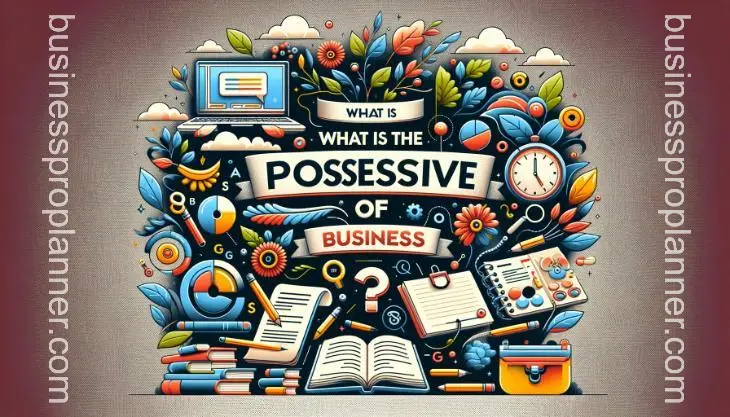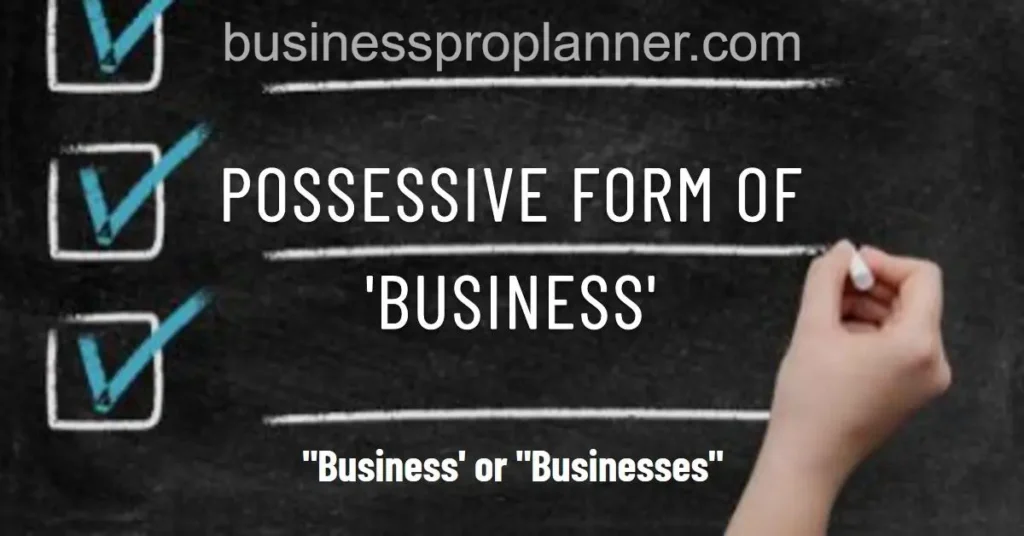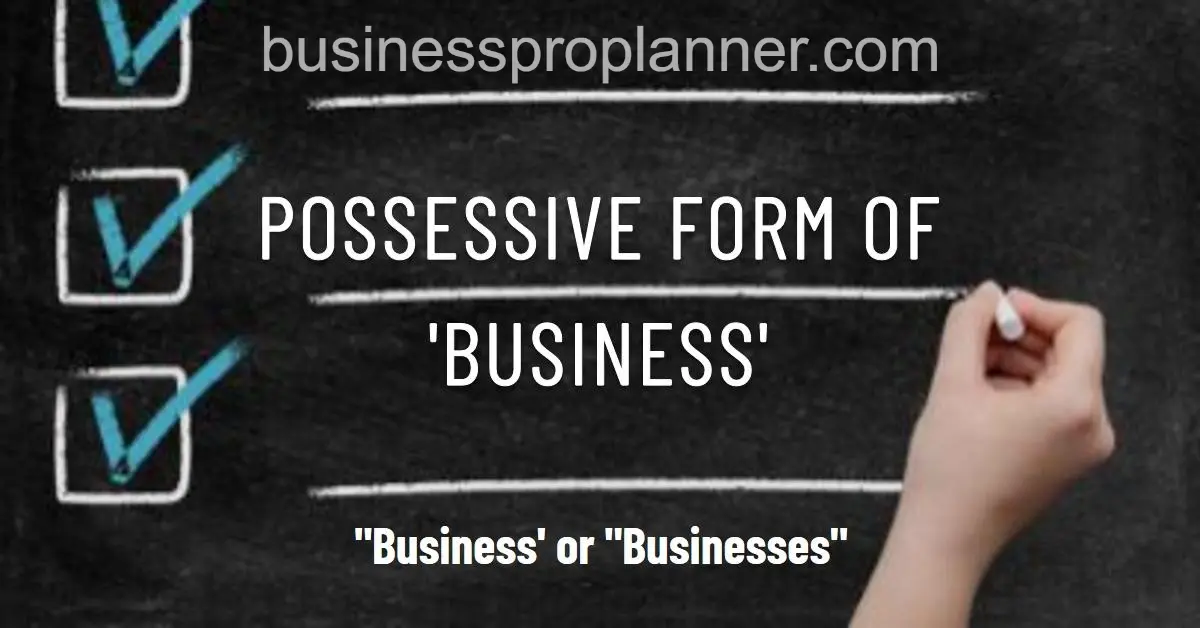Whether referring to one or many businesses, it’s important to know the proper possessive form to use in a given context. The rules for making singular or plural nouns possessive in English can lead to confusion when applied to a tricky word like “business”.
Should you say “the business’ website” or “the business’s website”? Is it “the businesses’ employees” or “the businesses’s employees”?
Grasping the distinction between the non-possessive plural form “businesses” and its possessive counterpart “businesses'” is crucial for correct grammar.
In this detailed guide, we will dive into the specifics of using “business” in its possessive form, ensuring clear and correct communication in your writing.
Key Takeaways
- The singular form “business” refers to one company or enterprise. Employ “businesses” to indicate several companies together.
- To make “business” possessive, add an apostrophe + “s” to form “business’s”. This shows ownership or belonging.
- The plural possessive is “businesses'”, with the apostrophe after the “s”. Use this when multiple companies own something.
- “Business'” and “business’s” are technically correct possessive forms. Style guides differ on preferences.
- Common mistakes include using “business'” incorrectly instead of “businesses” and confusing plural/possessive forms.
What is the Possessive of Business?
In the realm of professional communication, correctly using the possessive form of “business” is essential for clarity and accuracy. It’s a common area of confusion, yet vital for proper grammar. English can be complex, particularly with possessives for nouns like “business”.

For one business, it’s “business’s,” as in “The business’s profits rose,” showing one company’s earnings. However, with several businesses, it becomes “businesses’,” like in “Several companies’ objectives matched,” indicating collective aims. It’s vital in business communication to distinguish these forms. Use “business’s” for one and “businesses” for multiple. This fine difference is crucial for clarity and professionalism.
When to Use the Singular “Business”
The term “business” singularly denotes a single enterprise or organization. It can refer to a specific business entity, like “my business” or “ABC Company business”.
You would use “business” when talking about:
- One particular company: “My business manufactures auto parts.”
- General business concepts: “Having a business plan is crucial for any new company.”
- Attributive nouns before another noun: “The business model was unsustainable.”
The singular “business” is only used when referring to one business. If mentioning multiple companies, you need to use the plural “businesses” instead.
Making “Business” Plural: “Businesses”
To pluralize “business,” just append “es,” creating “businesses.” Apply this form when referring to multiple firms, companies, or enterprises.
For example:
- “Many new businesses were started this year.”
- “Local businesses should partner together.”
- “The corporate landscape has many large businesses.”
The plural “businesses” adhere to regular grammar norms for singular nouns ending in “s,” similar to “class,” “lens,” and “bus,” which become plural by adding “es.”
Singular vs Plural: Knowing the Difference
Distinguishing between “business” in singular and plural forms ensures appropriate usage in various contexts, such as:

| Singular Form | Plural Form |
|---|---|
| Business | Businesses |
| Refers to 1 company | Refers to 2+ companies |
| “My business is very small.” | “Most businesses fail in the first few years.” |
| Business’s (possessive singular) | Businesses’ (possessive plural) |
| Shows 1 business owning something | Shows multiple businesses owning something |
| “The business’s website is well-designed.” | “The businesses’ employees work hard.” |
The single form “business” turns into the plural “businesses,” and the possessive “business’s” becomes “businesses'” for multiple entities.
Choosing the wrong version alters your sentence’s meaning, so always check if you are discussing one or several businesses.
Forming the Possessive of “Business”
To make the singular noun “business” possessive, meaning to show ownership or belonging, you add an apostrophe + “s”:
“business’s”
For example:
- “The business’s headquarters are in Chicago.”
- “We need to update the business’s branding.”
- “The features of the product align with the business’s objectives.”
This follows the standard grammar rule for forming the possessive case of most singular nouns in English. You simply add ‘s to the end of the base word.
For plural possessive nouns, like “businesses'”, the apostrophe comes after the existing “s”:
- “The businesses’ investments generated returns.”
- “The owners of the businesses’ employees worked together.”
You would use the plural possessive “businesses'” when multiple companies own something together.
“Business'” vs. “Business’s” Usage
There is an ongoing debate about whether to use “business'” or “business’s” as the possessive form of the singular noun “business”. Though both are technically correct, different style guides have different preferences.
The Associated Press Stylebook recommends using “business'” without adding an extra “s” when making “business” possessive. They reason that omitting the second “s” improves readability. For example:
- The business’s main objective is growth.
In contrast, The Chicago Manual of Style advises using “business’s” with the additional “s” to form the possessive singular. They consider this grammatically correct for most singular nouns. For instance:
- The business’s marketing strategy was successful.
So which should you use? For consistency’s sake, it’s best to choose one style and adhere to it throughout a document. Use “business'” when following the AP style and “business’s” for the Chicago style.
Tips for Remembering Proper Usage
To remember when to use “business'” versus “business’s”, keep these tips in mind:
- AP Stylebook – Use “business'” (no extra “s”)
- Chicago Manual of Style – Use “business’s” (with extra “s”)
- If following one style guide, be consistent.
- “Business’s” emphasizes the singular possessive.
- “Business'” can improve readability.
Common Grammar Mistakes and Correct Usage
Here are some of the common grammar mistakes to avoid when using the possessive “business”:
- Using “business'” incorrectly instead of plural “businesses”
- Wrong: The business’ are collaborating.
- Right: The businesses are collaborating.
- Adding apostrophe + “s” to plural “businesses’s”
- Wrong: The businesses’s owners attended the conference.
- Right: The businesses owners attended the conference.
- Saying “business” when the plural “businesses” is needed
- Wrong: The business sell different products.
- Right: The businesses sell different products.
- Confusing plural non-possessive “businesses” and possessive “businesses'”
- Wrong: The businesses’ products were popular.
- Right: The businesses’ products were popular.

Conclusion
To wrap up, grasping when to use “business” in singular, plural, and possessive forms is crucial. “Business” denotes a single entity, whereas “businesses” indicates several. For singular ownership, it’s “business’s”, and for multiple businesses, use “businesses'”.
Keep in mind, that “business” becomes “businesses” as it’s an irregular noun. For possessive forms of singular nouns ending in ‘s’, adding just an apostrophe is standard, but styles like AP may differ, choosing “business'” over “business’s”.
In essence, be mindful of whether you are talking about one or more businesses before picking the right form. Adhering to these norms ensures grammatical accuracy and clear communication. Understanding these rules empowers you to write effectively about single or multiple companies.

